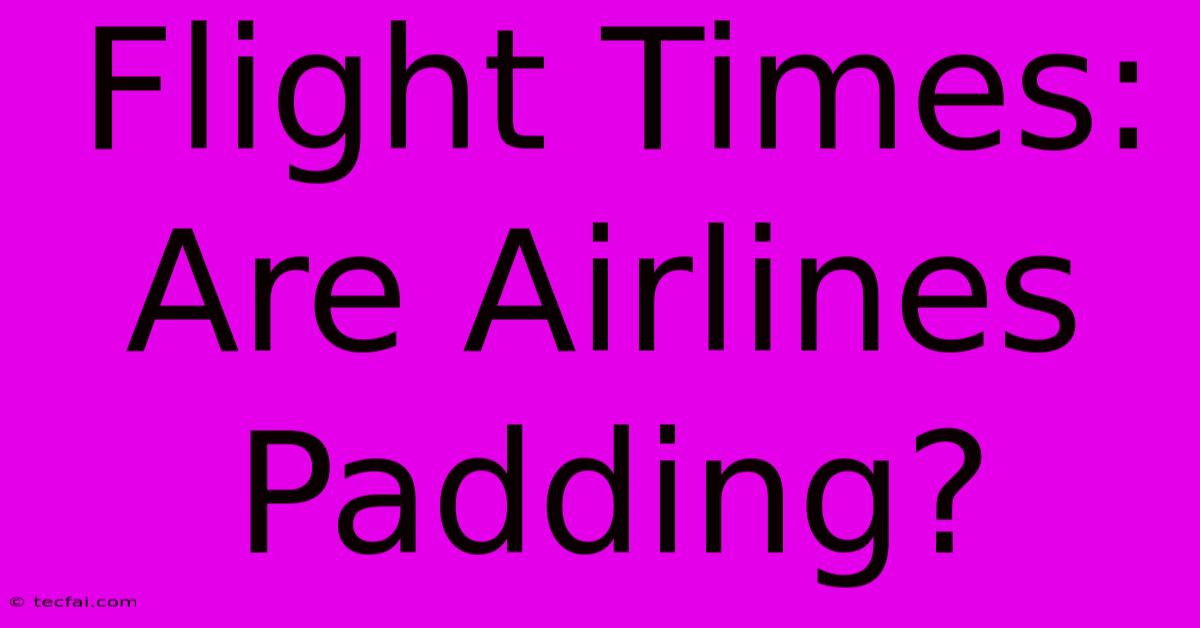Flight Times: Are Airlines Padding?

Discover more detailed and exciting information on our website. Click the link below to start your adventure: Visit Best Website tecfai.com. Don't miss out!
Table of Contents
Flight Times: Are Airlines Padding?
Are airlines manipulating flight times to their advantage? It's a question that's been buzzing around the internet, fueled by anecdotal evidence and frustrating experiences. While there's no smoking gun proving widespread, deliberate padding, a closer look reveals several factors that contribute to flights often taking longer than the scheduled time. Let's delve into the complexities of flight times and explore the possibilities.
The Mystery of the "Buffer Time"
One of the primary arguments supporting the "padding" theory is the existence of seemingly excessive buffer time built into schedules. A flight scheduled for 2 hours and 30 minutes might, on average, only take 2 hours of actual flight time. Where does the extra 30 minutes go? Is it padding, or is there a legitimate reason for this discrepancy?
Several factors contribute to this extra time:
-
Taxi Time: This refers to the time spent on the ground, moving from the gate to the runway and vice-versa. Taxiing can be significantly impacted by air traffic congestion, weather conditions, and even the efficiency of ground crews. Unexpected delays during taxiing are common.
-
Air Traffic Control Delays: Air traffic control (ATC) manages the flow of air traffic, sometimes causing delays due to congestion, weather-related restrictions, or other unforeseen circumstances. Airlines have little control over ATC delays.
-
Weather Conditions: Severe weather, including storms, heavy fog, or strong winds, can significantly impact flight times, causing delays or diversions. Airlines must prioritize safety, even if it means extending flight duration.
-
Gate Availability: Upon arrival, a plane needs a gate to unload passengers and prepare for the next flight. Delays in gate availability can cause further delays for passengers disembarking.
Beyond the Obvious: Other Contributing Factors
While the factors listed above explain some of the discrepancies between scheduled and actual flight times, other contributing factors are often overlooked:
-
Maintenance and Safety Checks: Routine maintenance and pre-flight safety checks are crucial for ensuring flight safety. These checks can take longer than anticipated, impacting the departure time and overall flight duration.
-
Boarding Procedures: Boarding can sometimes be a surprisingly time-consuming process. Challenges like passenger delays, baggage issues, and crew coordination can all lead to extended boarding times.
-
Fuel Efficiency Strategies: Some airlines may intentionally schedule longer flight times to optimize fuel consumption. Flying at a slightly slower speed can sometimes lead to lower fuel usage and reduced carbon emissions.
Are Airlines Deliberately Padding Flight Times?
The evidence doesn't strongly support the theory of widespread deliberate padding by airlines. The reasons for longer-than-scheduled flight times are usually multifaceted and linked to operational complexities and safety considerations. While there might be individual instances of over-scheduling, it's unlikely to be a systematic, industry-wide practice.
However, transparency is crucial. Airlines could better manage passenger expectations by providing more detailed information on potential delays and factors affecting flight times, building greater trust and understanding with their customers.
Conclusion: A Complex Equation
The question of whether airlines are padding flight times is more nuanced than a simple yes or no. While deliberate padding is unlikely to be a widespread practice, several legitimate factors contribute to flights frequently exceeding their scheduled duration. Improving transparency and communication around these factors would significantly benefit airlines and passengers alike, promoting a more positive and predictable travel experience. Instead of focusing on the "padding" accusation, exploring ways to improve operational efficiency and enhance passenger communication would be a more constructive approach to improving the overall air travel experience.

Thank you for visiting our website wich cover about Flight Times: Are Airlines Padding?. We hope the information provided has been useful to you. Feel free to contact us if you have any questions or need further assistance. See you next time and dont miss to bookmark.
Featured Posts
-
Pakistan Series Leveled By Ayub
Nov 27, 2024
-
Citys Return Ucl Lineup Boost
Nov 27, 2024
-
Regulatory Fine Payments Firm Pays E324k
Nov 27, 2024
-
Department To Reassess Court Decision
Nov 27, 2024
-
Election Petition The Business Owners Role
Nov 27, 2024
